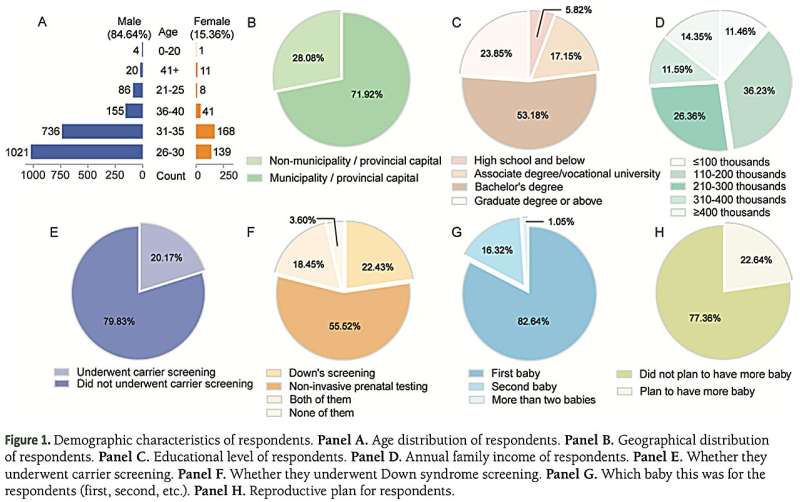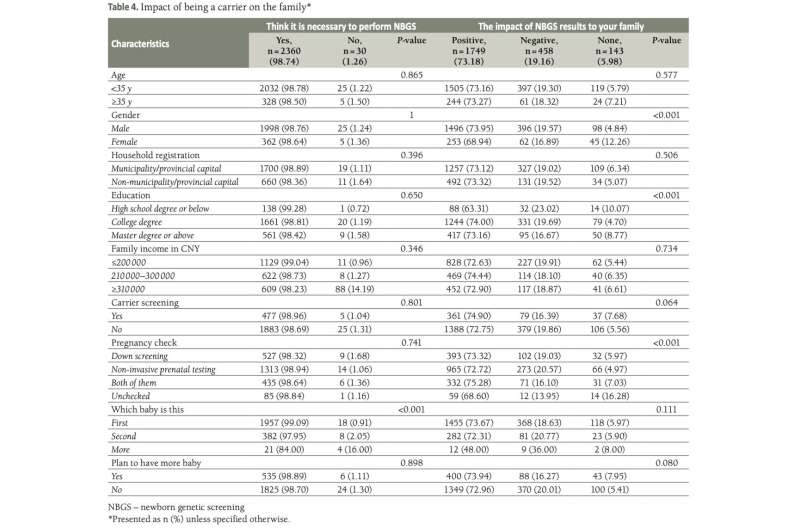This article has been reviewed according to Science X's editorial process and policies. Editors have highlighted the following attributes while ensuring the content's credibility:
fact-checked
proofread
Enhancing newborn genetic screening via prenatal carrier screening

Newborn genetic screening (NBGS) seeks to assist in the early identification of newborns at risk for severe genetic disorders. The integration of genomics into newborn screening represents a significant advancement, enhancing disease detection while reducing false positive rates. However, sharing results about genetic carriers is a delicate balance between sharing important information and not causing unnecessary worry for families.
To navigate these complex considerations, a joint study led by Nanjing Women and Children's Healthcare Hospital and Jing-Yu Zhao at BGI Genomics, recently published in the Journal of Global Health, surveyed parents of newborns identified as carriers through genetic screening. This research aimed to gather their perspectives and inform the development of these vital screening programs.
Research methodology
The study focused on parents of newborns identified as carriers through NBGS at the Nanjing Women and Children's Healthcare Hospital. A comprehensive survey comprising 26 questions was distributed, collecting responses from 2,390 participants. The survey delved into various aspects, including demographic information, understanding of genetic diseases, and the perceived impact of NBGS results.

Key fndings
The average age of the respondents was 30.7 years, with a predominance of positive perceptions towards NBGS. Specifically:
- Parental knowledge and attitude towards NBGS: A considerable majority of parents demonstrate an admirable level of awareness regarding NBGS, acknowledging its essential role in the early detection of diseases. A significant 73.18% of the participants are of the opinion that NBGS will positively affect their future by enhancing the understanding of their child's health conditions.
- The dilemma of reporting carrier status: Despite the potential for family anxiety, an overwhelming 98.95% of parents expressed a preference for being informed about carrier results. This indicates a strong parental desire for comprehensive genetic information regarding their children, underlining the necessity for transparency within NBGS processes.
- Impact of prenatal carrier screening: The study highlights a critical observation that families subjected to prenatal carrier screening possess a superior comprehension of NBGS. This suggests that such screenings are instrumental in promoting the implementation of NBGS. Additionally, NBGS carrier reports are seen to potentially encourage parents to pursue carrier screening before subsequent pregnancies, particularly for conditions with higher incidence rates. The revelation that their baby is a carrier prompted 98.83% of couples to consider prenatal counseling before planning another pregnancy, and 91.63% resolved to inform their child about their carrier status upon reaching adulthood, notably among high-income families and those previously screened.
- Socioeconomic and educational influences: The study sheds light on the socioeconomic and educational variances in the awareness and attitudes towards NBGS. It was observed that higher education levels and incomes correlate with an improved understanding, indicating the impact of socio-economic factors on health literacy.
These findings show if people are more aware of and take part in prenatal carrier screening, it could greatly improve implementation and acceptance of NBGS. NBGS also has the potential to advance carrier screening practices. After learning that a baby is a carrier, many parents are willing to undergo carrier screening before having another child, especially for diseases with a relatively high incidence, thereby reducing the risk for the next child.
More information: Xin Wang et al, Utility, benefits, and risks of newborn genetic screening carrier reports for families, Journal of Global Health (2024). DOI: 10.7189/jogh.14.04044
















